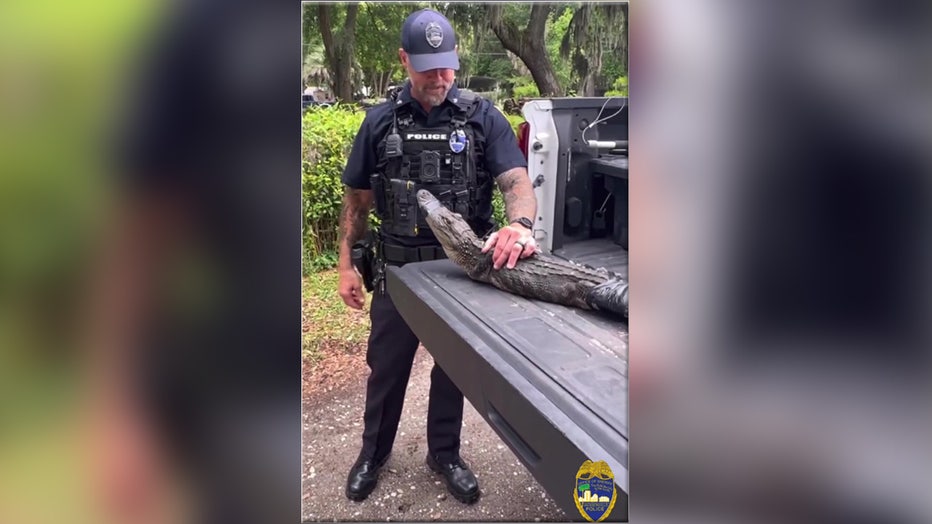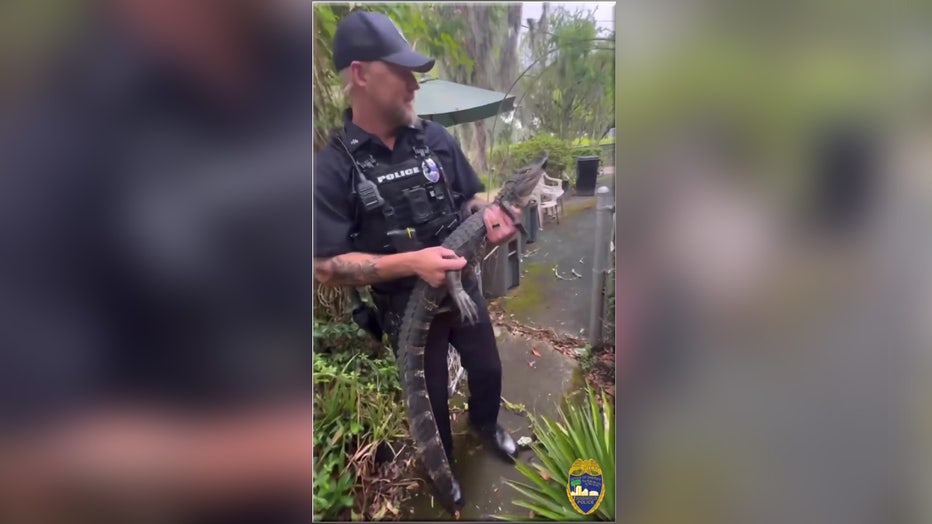Florida deputy chomps at the bit to wrangle gator from 104-year-old woman’s home: 'We can't cuff him'
JACKSONVILLE, Fla. - A 104-year-old Florida woman has quite a 'tail' to tell after an alligator worked its way onto her property.
Officers Kopp and Johnson of the Jacksonville Sheriff’s Office were recently sent to the woman’s Jacksonville home for reports of an alligator.
READ: Gator caught taking a dip in Florida pool
In a video posted on social media, a deputy can be heard telling the gator it was under arrest and needed "to leave the grandmas alone."

Jacksonville deputy reads 5-foot alligator the riot act after it wandered onto a 104-year-old woman's property. Image is courtesy of the Jacksonville Sheriff's Office.
The deputy added that while he couldn’t cuff the gator, he was going to take it downtown.
READ: ‘Angry’ alligator attacks Florida farm worker: MCSO
Licensed trapper Mike Dragich helped wrangle the reptile, so the woman could say, "See you later, alligator."

A gator trapper helped relocate the gator to a safer location. Image is courtesy of the Jacksonville Sheriff's Office.
According to JCO, the five-foot gator is alive and was safely relocated to another area.
Alligator mating season is in full swing.

The deputy joked he was going to take the gator downtown. Image is courtesy of the Jacksonville Sheriff's Office.
Alligator safety tips from FWC
- If you encounter an alligator that is believed to pose a threat to people, pets, or property, call the FWC’s Nuisance Alligator Hotline, toll‐free at 1‐866‐FWC‐GATOR (392‐4286). The FWC’s Statewide Nuisance Alligator Program (SNAP) uses contracted nuisance alligator trappers throughout the state to remove alligators 4 feet in length or greater that are believed to pose a threat.
- Be aware of the possible presence of alligators when in or near fresh or brackish water. Negative alligator encounters may occur when people do not pay close attention to their surroundings when working or recreating near water.
- Closely supervise children when they are playing in or around water.
- Never swim outside of posted swimming areas.
- Swim only during daylight hours. Alligators are most active between dusk and dawn.
- Do not allow pets to swim, exercise, or drink in or near waters that may contain alligators or in designated swimming areas with humans. Dogs are more susceptible to being bitten than humans because dogs resemble the natural prey of alligators. The sound of dogs barking and playing may draw an alligator to the area.
- Never feed or entice alligators – it is dangerous and illegal. When fed, alligators overcome their natural wariness and associate people with food.
- Inform others that feeding alligators is illegal and creates problems for others who want to recreate in or near the water.
- Dispose of fish scraps in garbage cans at boat ramps and fish camps – do not throw them in the water. Although you are not intentionally feeding alligators when you do this, the result can be the same.
- Observe and photograph alligators only from a safe distance. Remember, they are an important part of Florida’s natural history as well as an integral component of freshwater ecosystems.
- Leave alligators alone. State law prohibits killing, harassing, or possessing alligators except under a permit.
- Never remove an alligator from its natural habitat or accept one as a pet. It is illegal and dangerous to do so. Handling even small alligators can result in injury.
- If an alligator bites you, the best thing to do is fight back, providing as much noise and resistance as possible. Hitting or kicking the alligator or poking it in its eyes may cause it to release its grip.
- When alligators seize prey they cannot easily overpower, they will often let go and retreat.
- Seek immediate medical attention if bitten by an alligator. Alligator bites often result in serious infection.
SIGN UP: Click here to sign up for the FOX 13 daily newsletter

